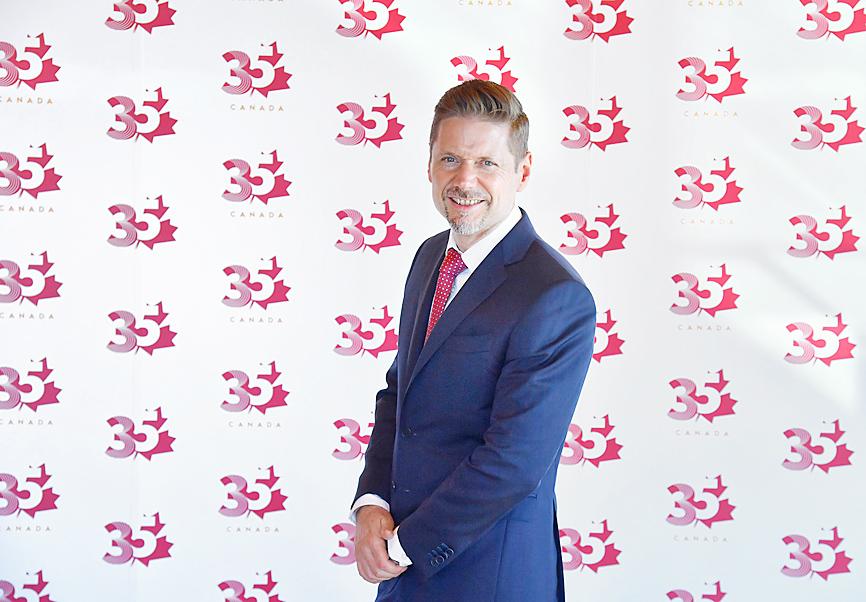Canada’s de facto embassy is celebrating its 35th anniversary in Taiwan this year, having witnessed the nation’s democratic transformation amid growing cooperation between Taipei and Ottawa in multiple areas, Canadian Trade Office in Taipei (CTOT) Executive Director Jordan Reeves said.
CTOT represents Canada’s interests in Taiwan in the absence of official diplomatic ties.
“We’re celebrating CTOT’s 35th year, but we’re also celebrating Taiwan’s successful transition to a high-tech democratic society, because this has certainly contributed to the richness and diversity of our people-to-people ties today,” Reeves said.

Photo: CNA
CTOT opened on Nov. 28, 1986, with only three employees and a goal of supporting bilateral exchanges and Canadians living in Taiwan, he said.
“At the time, there were no direct flights to Canada, bilateral trade was only C$1.6 billion [US$1.25 billion] and of course, Taiwan at that time was still under martial law,” he said.
Since then, Taiwan has changed a great deal. It has become a democracy, with its first direct presidential election held in 1996, he said.
“Taiwan has also made enormous strides in terms of gender equality, human rights, democratic governance, media freedom, all these areas, and has become a very trusted friend and trading partner for Canada,” Reeves said.
Trade between the two countries was valued at C$7.5 billion in the first nine months of the year, he said, adding that trade has increased 10 percent annually since the office opened.
Today, three airlines offer direct flights between Taiwan and Canada, although most have been suspended due to the COVID-19 pandemic.
Reeves said that since 1986, the two countries have signed 40 memorandums of understanding in areas ranging from agricultural science to transportation and safety, with 28 still in place.
“You can say that the expansion of our office, our size and responsibilities have also very closely tracked Taiwan’s transition to a vibrant and economically diverse, inclusive society,” he said.
Naming one area of close bilateral cooperation, Reeves said Taiwan’s national health insurance scheme, launched in 1995, was partly modeled on Canada’s universal healthcare system.
More recently, Canadian public health officials have participated in discussions with Taiwan’s Ministry of Health and Welfare to learn from Taiwan how to best control and manage COVID-19, he said.
Another area of cooperation is on indigenous issues, and the two countries have for two decades organized exchanges and collaboration between indigenous leaders, policymakers and artists, Reeves said.
“We also started, back in 2010, a working holiday program for Taiwanese youth, and under that program to date, 12,000 Taiwanese youth have visited Canada,” he said.
Looking to the future, Reeves said that the latest round of the annual Canada-Taiwan economic dialogues, held on Dec. 14, would bolster supply chain cooperation, and deepen bilateral trade and investment ties, with plans to undertake a joint supply chain study in sectors of mutual interest.
The two countries also discussed organizing a series of business roundtables beginning next year focused on electric vehicles, 5G, advanced manufacturing and other areas, a CTOT news release said.
Taiwan was Canada’s 15th-largest trading partner and its sixth-largest in Asia last year, CTOT said.

Taiwan is stepping up plans to create self-sufficient supply chains for combat drones and increase foreign orders from the US to counter China’s numerical superiority, a defense official said on Saturday. Commenting on condition of anonymity, the official said the nation’s armed forces are in agreement with US Admiral Samuel Paparo’s assessment that Taiwan’s military must be prepared to turn the nation’s waters into a “hellscape” for the Chinese People’s Liberation Army (PLA). Paparo, the commander of the US Indo-Pacific Command, reiterated the concept during a Congressional hearing in Washington on Wednesday. He first coined the term in a security conference last

Prosecutors today declined to say who was questioned regarding alleged forgery on petitions to recall Democratic Progressive Party (DPP) legislators, after Chinese-language media earlier reported that members of the Chinese Nationalist Party (KMT) Youth League were brought in for questioning. The Ministry of Justice Investigation Bureau confirmed that two people had been questioned, but did not disclose any further information about the ongoing investigation. KMT Youth League members Lee Hsiao-liang (李孝亮) and Liu Szu-yin (劉思吟) — who are leading the effort to recall DPP caucus chief executive Rosalia Wu (吳思瑤) and Legislator Wu Pei-yi (吳沛憶) — both posted on Facebook saying: “I

The Ministry of Economic Affairs has fined Taobao NT$1.2 million (US$36,912) for advertisements that exceed its approved business scope, requiring the Chinese e-commerce platform to make corrections in the first half of this year or its license may be revoked. Lawmakers have called for stricter enforcement of Chinese e-commerce platforms and measures to prevent China from laundering its goods through Taiwan in response to US President Donald Trump’s heavy tariffs on China. The Legislative Yuan’s Finance Committee met today to discuss policies to prevent China from dumping goods in Taiwan, inviting government agencies to report. Democratic Progressive Party Legislator Kuo Kuo-wen (郭國文) said

The Ministry of Economic Affairs has fined Taobao NT$1.2 million (US$36,900) for advertisements that exceeded its approved business scope and ordered the Chinese e-commerce platform to make corrections in the first half of this year or its license would be revoked. Lawmakers have called for stricter supervision of Chinese e-commerce platforms and more stringent measures to prevent China from laundering its goods through Taiwan as US President Donald Trump’s administration cracks down on origin laundering. The legislature’s Finance Committee yesterday met to discuss policies to prevent China from dumping goods in Taiwan, inviting government agencies to report on the matter. Democratic Progressive Party